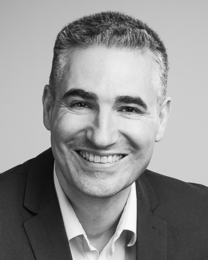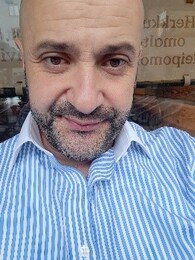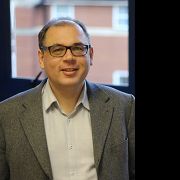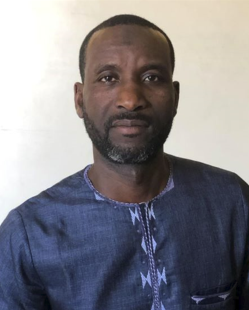Keynote Speakers
|
Keynote 1: Olivier Lézoray (University of Caen Normandie, France):
Multivariate approaches for graph signal morphological processing
|
 |
Olivier Lézoray received the M.Sc. and Doctoral degrees in Computer Science from the University of Caen Normandy, France, in 1996 and 2000, respectively. From 1999 to 2000, he was an Assistant Professor with the Computer Science Department of the University of Caen. In 2000, he joined the Cherbourg Institute of Technology as an Associate Professor of Computer Science in the Communication Networks and Services Department and was director of graduate studies (2000-2009). From 2008 to 2016, he was the Chair of the Cherbourg Institute of Technology Research Committee. In 2010, he became a Full Professor at the Cherbourg Institute of Technology in the Multimedia and Internet (MMI) Department. He was the head of the MMI Department from 2015 to 2021. His research interests are in graph-based signal processing, adaptive and multidimensional mathematical morphology, and machine learning. Applications of his works include computational photography, computer-aided diagnosis, and computer vision. He is an Associate Editor for the IEEE Transactions on Signal Processing and the IET Image Processing, and has guest-edited for the following journals: Journal of Electronic Imaging, Signal Image and Video Processing, Computerized Medical Imaging and Graphics, Signal Processing, and the EURASIP Journal on Advances in Signal Processing. He is a Senior Member of the IEEE and a member of IAPR and EURASIP.
|
| |
|
Keynote 2: Abdenour Hadid (Université Polytechnique Hauts-de-France):
Artificial Intelligence in Healthcare, HCI, Autonomous Driving, and Future Applications
|
 |
Abdenour Hadid is a Professor in a Chair of excellence on Artificial Intelligence and Transports RIVA with the UPHF. His research interests include computer vision, deep learning, artificial intelligence, internet of things, autonomous driving and personalized healthcare. He has authored more than 300 papers in international conferences and journals, and served as a reviewer for many international conferences and journals. His research works have been well referenced by the research community with more 18000 citations and an H-Index of 46, according to Google Scholar. Prof. Hadid is currently a senior member of IEEE. He was the recipient of the prestigious “Jan Koenderink Prize” for fundamental contributions in computer vision. He participated and played a key role in different European projects. One of these projects has been selected as a Success Story by the European Commission. His achievements have also been recognized by many awards including the highly competitive Academy Research Fellow position from the Academy of Finland during 2013-2018, and a very prestigious international award within the 100-Talent Program (Outstanding Visiting Professor) of Shaanxi Province, China. |
|
Keynote 3: Thomas Hain (Sheffield University, UK)
Do Machines Finally Understand Us ? A Review of the State of the Art in Speech Processing Technologies
|
|

|
Thomas Hain is Professor for Computer Science at the University of Sheffield. He is also the Director of UKRI Centre for Docotral Training in Speech and Language Technologies and Thier Applications and the Director of Centre for Speech and Language Technology (VoiceBase). He holds the degree `Dipl.-Ing’ in Electrical and Communication Engineering from the University of Technology, Vienna, and a PhD in Information Engineering from Cambridge University (2002). Prof. Hain is the Head of the Speech and Hearing group at Sheffield University, leads the 15-strong subgroup on Machine Intelligence for Natural Interfaces, and is a member of the Machine Learning Research group. He has more than 170 publications on Machine Learning and speech recognition topics (Google citations 12k, h-index 36). In addition to membership of many technical committees, including repeated positions of area chair at ICASSP, Interspeech, and ICPR, he was organising committee member of Interspeech 2009, IEEE ASRU 2011 and 2013. He is also one of the key organisers and designated technical chair of Interspeech 2019. He was an Assoc. Editor of ACM Transactions on Speech and Language Processing, and is currently a member of the editorial board of Computer Speech & Language. Prof. Hain has been an investigator on more than 20 projects, with a cumulative research budget of £ 9M (£ 4M as PI). Until recently he served as PI at Sheffield for the EPSRC programme grant NST (total budget £ 6.2M, Sheffield £ 2.2M), and currently works on industrial projects from Google, dstl, and ITSLanguage. Current projects include MAUDIE (Innovate UK), Tuto (industry) and BiT(University). Prof. Hain is currently setting up a centre funded by industry that will host an additional 10 researchers in speech and language processing.
|
|
Keynote 4: Babacar Mbaye Ndiyae (University of Cheikh Anta Diop, Dakar-Senegal)
Using mobile phone data for Spatial Planning simulation and Optimization Technologies
|
 |
Babacar Mbaye Ndiyae is a full professor in Applied Mathematics at the University of Cheikh Anta Diop, Dakar-Senegal. Hisresearch focuses on Modeling, Global optimization - Theory, algorithms and applications (via cutting plane, Branch&Bound, DC (Difference of Convex functions) Programming, DCA (DC Algorithm), Senegaulois algorithm & local search algorithm). He has applied these methods to Machine Learning, Big data and to real world problems in a variety of domains, such as land use, scheduling AGV in automated container terminal, single straddle carrier routing problem in port container terminals, dead mileage in urban bus routes, network problems in optimal mass transportation, breakdown mechanic location problem, scheduling aircraft landings, p-median problem in school allocation, large scale two-dimensional packing problems and multimodal transport problem. In 2015, his research team were recognized for the Data Crossing Prize (Using mobile phone data for Spatial Planning simulation and Optimization Technologies (SPOT)) during the D4D Big data challenge. This was a contribution for citizen activities. They have proposed a methodology to find locations or relocations of some Dakar region amenities (home, shop, work, leisure places). They have generated representative agent plans from mobile phone data provided by Orange. Since 2012, he has been interested in optimal mass transportation, shape optimization and Big data.
|
|


